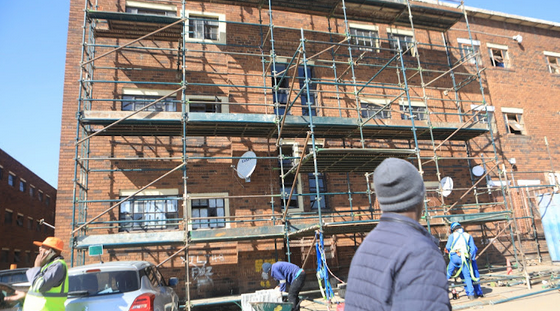CETCs need to step up to help solve high adult illiteracy

Advertising
06-08-2024
Read : 273 times
The Content Engine
Source
South Africa is being held back by high levels of functional illiteracy. While tremendous strides have been made in terms of equipping working-age adults with literacy and numeracy skills, significantly more will have to be done to make a real impact.
Over the past decade, there has been a 6% reduction in the adult illiteracy rate. This has mainly been achieved via strategic adult-basic education and training (ABET) programmes for adults who have not completed basic schooling. However, just under 4-million South African adults are still functionally illiterate or do not have workplace literacy skills. In the Eastern Cape, for example, 34% of the more 1-million people employed are unskilled workers. Only 20% are skilled workers who could possibly adapt to the requirements of the Fourth Industrial Revolution.
Among these AET programmes are those sponsored by blue-collar-intensive industries. They are either geared towards equipping low- and unskilled employees or communities located within their operational footprint and from where they source their labour with workplace literacy skills. For example, AET has been a cornerstone of skills development in the mining industry for many years. Notably, the number of learners entering the mine-sponsored programmes has been declining over the past few years. This is an indication of an improvement in the skills levels of employees in the sector and the overall efficacy of these AET programmes, often outsourced to accredited specialists.
However, not all South African adults can access these quality adult literacy and numeracy training programmes. Their only other option is to attend adult literacy and numeracy training classes provided by government. To date, these community education and training colleges (CETCs) have largely failed in providing a quality education to adults who have not completed Grade 9. The bedrock of basic education, Grade 9 is the first band on the National Qualifications Framework (NQF). Individuals who have succeeded in completing AET Level 4, the final step in a AET programme, possess skills that are equivalent to someone who has completed Grade 9. This is denoted by a General Education and Training Certificate (GETC): AET.
Yet, the concept of community colleges has been very successful in addressing unemployment in countries such as Mexico, India, Canada and Ethiopia. This is also the ultimate objective of South Africa’s CETCs, but they have grappled with inadequate funding to cover tuition; programme design; and staffing. Their curricula have also not kept pace with the rapidly changing demands of industry. There has, thus, been a marked decline in the number of adults enrolling at these CETCs over the years. Of those who do, very few complete the programme, either dropping out or failing their examination.
“Workplace literacy skills have evolved and expanded considerably during the 21st century. Literacy is no longer just about reading and writing, but also includes the ability to engage with technology. Even blue-collar workers now need to advance and develop an informed and professional identity in technology-intensive workplaces. This includes the ability to act autonomously and being self-organising and motivated. Furthermore, modern factory, construction, mining, farm and transport workers must be able to use information and knowledge to create their own work opportunities. In addition, they can think critically and creatively, as well as collaborate and communicate effectively. General AET training no longer cuts it. Industry needs to inform the curricula offered,” Marco Maree, Expert Training & Development Advisor of Triple E Training, says. Triple E Training is a leading provider of AET to industry for workplace and community upskilling.
Maree believes that a complete overhaul of the CETCs is in order, considering the extent of the adult illiteracy challenge with which the country is grappling. In 2022, adult illiteracy cost the South African economy more than R6-billion. This is mainly due to reduced earning costs and the social impacts associated with illiteracy.
Earlier, the Department of Higher Education and Training acknowledged the need to fully resource the CETCs to provide greater access to quality to relevant AET. It also noted that the CETCs as a sector had to set targets for reducing illiteracy through the provision of quality AET.
Worryingly, the continued underperformance of state-driven AET programmes is against robust policies and legislative frameworks that facilitate adult literacy and numeracy training. These include the National Skills Development Act and Skills Development Levy Act, as well as the Adult Education and Training Act. The latter provides for the establishment of public and private adult learning centres; funding for adult education; the governance of public centres; and quality assurance mechanisms for the sector. This was followed by the third National Skills Development Strategy.
The numbers speak for themselves. Just 130 752 adults enrolled at CETCs in 2022. 38,8% of these enrolments were for the GETC: AET NQF 1. Of the 41 586 students who registered for the course, only 25 315 wrote the exam and a paltry 10 383 passed it. KwaZulu-Natal and Mpumalanga achieved higher completion rates than the national average of 41%.
Notably, more than 8 000 of the students who passed were women who were determined to succeed in equipping themselves with basic education skills. The largest gender disparity was in the Eastern Cape where 2 528 women succeeded in attaining a GETC: AET compared to the only 1 068 men who passed the exam.
But what of the many women who failed the course and those who were unable to access AET via the CETCs – let alone those quality programmes driven by the private sector? Bear in mind that as many as 25 237 women enrolled for AET Level 4 at the CETCs. Illiteracy levels are higher for South African women than for men at 10,7% and 9,3%, respectively.
This means that many women continue to miss out on opportunities to participate fully in society and the workforce.
“Illiteracy also fuels inequality. 95% of the students who enrolled at these colleges to either complete AET Level 4 or adult matric were African. Those who failed to complete the programme will struggle to find and retain work in an economy that is increasingly relying less on general workers. We need both strong private- and public-sector driven adult literacy and numeracy programmes to solve the problem. It is time for the CETCs to step up,” Maree concludes.
For more information contact:
David Poggiolini
Debbie Poggiolini
Recent News
Here are recent news articles from the Building and Construction Industry.
Have you signed up for your free copy yet?









